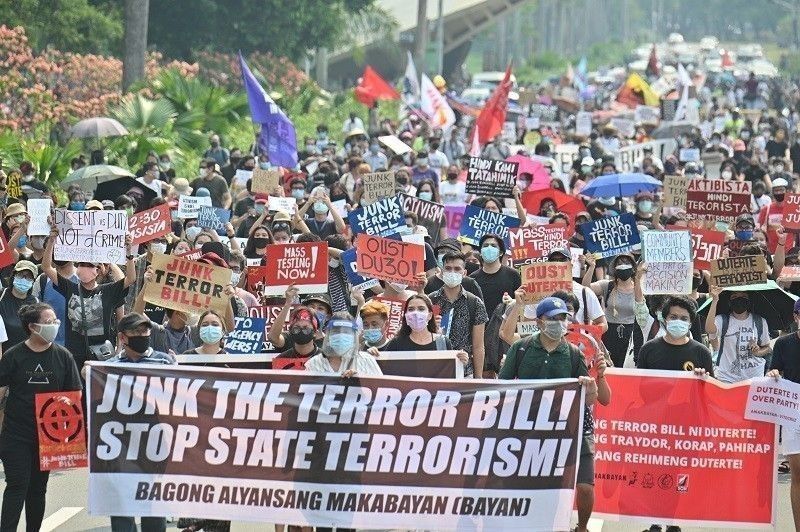Implementing rules of anti-terrorism law approved, publication within the week

MANILA, Philippines (Updated 3:27 p.m.) — The Anti-Terrorism Council approved on Wednesday the implementing rules of the controversial Anti-Terrorism Act of 2020, Justice Secretary Menardo Guevarra said.
In a message to reporters, Guevarra said the council approved Republic Act 11479’s Implementing Rules and Regulations, crafted by a technical group led by the Department of Justice.
“We will disseminate copies to the Congress and to law enforcement agencies as required under the law, and will publish the IRR online and in a newspaper of general circulation in the next few days,” Guevarra added.
Online publication will be done within the week, while the IRR will be printed on broadsheets this weekend, the DOJ chief also said.
Guevarra said the IRR is deemed effective upon publication and registration with the Office of the National Administrative Order Register at the University of the Philippines Diliman.
37 legal challenges vs anti-terrorism law
The Anti-Terrorism Law, which is facing 37 legal challenges at the Supreme Court, had already taken effect in July.
President Rodrigo Duterte signed Republic Act 11479 or the ATA on July 3, amid mounting criticism against the law deemed by law experts as infringing on the peoples’ freedom.
Malacañang insisted that the law took effect on July 19 or 15 days from when a copy of the law was uploaded on the Official Gazette website—although some petitioners contest this and said the law became effective on July 22.
Petitions against the law came from constitution framers, legal luminaries such as former SC acting chief justice Antonio Carpio, law academe, lawmakers, religious leaders, community leaders from Mindanao and dozens of civil society groups.
READ: Cheat sheet on the looming legal battle on the anti-terrorism law
They assailed the law for being vague and overbroad, and infringing on the people’s rights enshrined in the Constitution. The petitioners told the SC that the vague definition of “terrorism” under the law gives law enforcers unbridled discretion to interpret its provisions.
Past actions of State forces, who have a history of red-tagging and abuses, do not inspire confidence of the law’s fair implementation too, the petitioners added.
Asked if the IRR contains a provision on social media regulation—a recommendation earlier floated by military chief, Gen. Gilbert Gapay—Guevarra said: “No specific provision pertaining to social media regulation.”
A petition filed by youth leaders, filed through the National Union of Peoples' Lawyers-National Capital Region, earlier said that the IRR cannot be used to remedy the "defects" of the anti-terrorism law.
“Trying to ‘correct’ the glaring and inherent defect in the assailed law through its implementing rules must be avoided because of the dangers accompanying such a proposition, not the least of which is the unwarranted discretion being given to the law-enforcer when he is asked to set the rules for the implementation of a vague law,” they said.
The SC had previously said the petitions are set for oral arguments, but a date has yet to be set as of Wednesday.
President Rodrigo Duterte signed the Anti-Terrorism Law on July 3 despite opposition from rights groups and civil society groups that it could be used to stifle human rights.
A petition against the law has been filed at the Supreme Court and other groups are preparing pleadings of their own.
Follow this page for updates. Photo courtesy of The STAR/Michael Varcas
National Security Adviser Hermogenes Esperon moves to block access to several websites, including news sites of alternative news orrganizations Bulatlat.com and Pinoyweekly.org.
In his letter to the National Telecommunications Commission, he only says the websites are "affiliated to and are supporting these terrorists and terrorist organizations."
No other basis to back up his allegation was cited in the letter.
Citing the designation of the CPP-NPA-NDF as terrorists, NSA Hermogenes Esperon moves to block access to several sites.
— Kristine Patag (@kristinepatag) June 22, 2022
In Esperon's letter to the NTC, he included news sites @bulatlat and @pinoyweekly; sites of other progressive groups RMP and Save our Schools. @PhilstarNews pic.twitter.com/nAzMITJFsS
The Commission on Human Rights says it "partly welcomes" the Supreme Court decision that some parts of the controversial Anti-terrorism Law are unconstitutional.
CHR spokesperson Jacqueline de Guia says the commission remains hopeful that the remaining contentious provisions of the law will be clarified by the high cour in the full text of the decision.
"At the same time, our commitment remains in guarding against possible human rights violations arising from the implementation of the anti-terror law. We steadfastly remind the government that countering terrorism and protecting human rights are not competing values but are, in fact, mutual and complementary," De Guia says in a statement.
The Supreme Court has deliberated and voted on the controversial Anti-Terrorism Act but the decision will be released "at the soonest time possible."
"However, considering that there were numerous issues resolved in the case, as well as the fact that each Justice had to vote on each issue, there is a need to accurately confirm and tally the vote of each Justice in order to ensure the correct resolution of the Court per issue," SC spokesperson Brian Hosaka says.
The Anti-Terrorism Council designates the National Democratic Front of the Philippines, the panel that negotiates for communist rebels during peace talks a terrorist organization.
Previous designation of the Communist Party of the Philippines and New People's Army led to the designation of supposed members of the CPP's Central Committee. Among those designated as terorrists were peace consultants.
Designation gives the Anti-Terrorism Council the authority to investigate and freeze the accounts of designated persons.
The Anti-Terrorism Council has designated 29 people, including alleged members of the Communist Party of the Philippines-New People's Army, as terrorists in two resolutions.
Designation allows the Anti-Money Laundering Council to freeze the assets of those on the list.
- Latest
- Trending





























